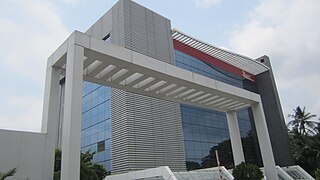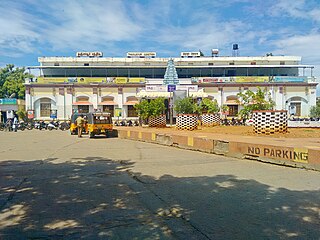| Regions with significant populations | |
|---|---|
| Beirut | |
| Languages | |
| Telugu · Kannada · Hindi · Marathi · Arabic | |
| Related ethnic groups | |
| Person of Indian Origin |
There is a small but recognisable community of Indians in Lebanon consisting of labourers and engineers mainly working in the industrial sector; some have opened their own businesses. The Indian migrants work in sectors of the Lebanese economy such as construction, manufacturing and the service sector. [1]
In 2006, the Indian population in Lebanon declined due to the Israel-Hezbollah War. The evacuees were first brought by Indian naval ships from the Lebanese capital of Beirut to Larnaca in Cyprus and then flown to India, under an Indian military-coordinated exercise called "Operation Sukoon."

The economy of India has transitioned from a mixed planned economy to a mixed middle-income developing social market economy with notable public sector in strategic sectors. It is the world's fifth-largest economy by nominal GDP and the third-largest by purchasing power parity (PPP); on a per capita income basis, India ranked 136th by GDP (nominal) and 125th by GDP (PPP). From independence in 1947 until 1991, successive governments followed the Soviet model and promoted protectionist economic policies, with extensive Sovietization, state intervention, demand-side economics, natural resources, bureaucrat driven enterprises and economic regulation. This is characterised as dirigism, in the form of the Licence Raj. The end of the Cold War and an acute balance of payments crisis in 1991 led to the adoption of a broad economic liberalisation in India and indicative planning. Since the start of the 21st century, annual average GDP growth has been 6% to 7%.
The National Security Council (NSC) of India is an executive government agency tasked with advising the Prime Minister's Office on matters of national security and strategic interest. It was established by the former Prime Minister of India Atal Bihari Vajpayee on 19 November 1998, with Brajesh Mishra as the first National Security Advisor.
Operation Sukoon was an operation launched by the Indian Navy to evacuate Indian, Sri Lankan and Nepalese nationals, as well as Lebanese nationals with Indian spouses, from the conflict zone during the 2006 Lebanon War.

Small Industries Development Bank of India (SIDBI) is the apex regulatory body for overall licensing and regulation of micro, small and medium enterprise finance companies in India. It is under the jurisdiction of Ministry of Finance, Government of India headquartered at Lucknow and having its offices all over the country.The SIDBI was established on April 2, 1990, by Government of India, as a wholly owned subsidiary of IDBI Bank. It was delinked from IDBI w.e.f. March 27, 2000. Its purpose is to provide refinance facilities to banks and financial institutions and engage in term lending and working capital finance to industries, and serves as the principal financial institution in the Micro, Small and Medium Enterprises (MSME) sector. SIDBI also coordinates the functions of institutions engaged in similar activities. It was established in 1990, through an Act of Parliament.

The Ministry of Agriculture and Farmers Welfare, formerly the Ministry of Agriculture, is a branch of the Government of India and the apex body for formulation and administration of the rules and regulations and laws related to agriculture in India. The three broad areas of scope for the Ministry are agriculture, food processing and co-operation. The agriculture ministry is headed by Minister of Agriculture and Farmers' Welfare which is currently held by Arjun Munda. Kailash Choudhary and Shobha Karandlaje are the Ministers of State. Sharad Pawar, serving from 22 May 2004 to 26 May 2014, has held the office of Minister of Agriculture for the longest continuous period till date.
The information technology (I.T.) industry in India comprises information technology services and business process outsourcing. The share of the IT-BPM sector in the GDP of India is 7.4% in FY 2022. The IT and BPM industries' revenue is estimated at US$ 245 billion in FY 2023. The domestic revenue of the IT industry is estimated at $51 billion, and export revenue is estimated at $194 billion in FY 2023. The IT–BPM sector overall employs 5.4 million people as of March 2023. In December 2022, Union Minister of State for Electronics and IT Rajeev Chandrasekhar, in a written reply to a question in Rajya Sabha informed that IT units registered with state-run Software Technology Parks of India (STPI) and Special Economic Zones have exported software worth Rs 11.59 lakh crore in 2021–22.

India–New Zealand relations are the interactions between India and New Zealand. Both these countries were once part of the British Empire. There are approximately 175,000 people of Indian descent in New Zealand.

The South Indian Bank Limited (SIB) is a major private-sector bank headquartered at Thrissur in Kerala, India. As of March 31, 2023, the bank had a network of 948 banking outlets (947 branches and 1 service branch) and 1322 ATMs/CRMs (1189 ATMs and 133 CRMs) spanning 26 states and 4 union territories).
india.gov.in is the Indian government’s web portal for citizens. It presents information resources and online services from government sources, accessible from a single point. It is also known as the National Portal of India.

There is a small community of Indians in Egypt includes Indian expatriates in Egypt, as well as Egyptian citizens of Indian origin or descent. Most of the Indian residents have senior level jobs, with the majority being professionals working for multinationals in the oil and gas, banking and IT sector and their postings are mainly senior positions, which means typically they are at least in their thirties and accompanied by their families. There are currently about 300 Indian companies, having joint ventures or wholly owned subsidiaries or offices in Egypt. Some of the top Indian companies with investments in Egypt are Wipro, Mahindra & Mahindra, Jindals, Indorama Ventures and Tatas.

The Lebanese Republic and the Republic of India established diplomatic relations in 1954. Lebanon maintains an embassy in New Delhi, while India maintains one in Beirut.

Thanjavur Junction is an NSG–3 category Indian railway station in Tiruchirappalli railway division of Southern Railway zone. It is a junction railway station in Thanjavur district in the Indian state of Tamil Nadu and serves Thanjavur, earlier known as Tanjore.
Statistics on unemployment in India had traditionally been collected, compiled and disseminated once every ten years by the Ministry of Labour and Employment (MLE), primarily from sample studies conducted by the National Sample Survey Office. Other than these 5-year sample studies, India had historically not collected monthly, quarterly or yearly nationwide employment and unemployment statistics on a routine basis. In 2016, the Centre for Monitoring Indian Economy, a non-governmental entity based in Mumbai, started sampling and publishing monthly unemployment in India statistics.

The 2014–2015 India–Pakistan border skirmishes were a series of armed clashes and exchanges of gunfire between the Indian Border Security Force and the Pakistan Rangers: the paramilitary gendarmerie forces of both nations, responsible for patrolling the India-Pakistan border) along the Line of Control (LoC) in the disputed Kashmir region and the borders of the Punjab. Tensions began in mid-July 2014, with both countries' military officials and media reports giving different accounts of the incidents and accusing each other of initiating the hostilities. The incident sparked outrage in both countries and harsh reactions by the Indian and Pakistani militaries and the Indian and Pakistani governments.
Govind Narain Malviya is an Indian physician and leprologist, known for his efforts in the treatment and rehabilitation of Leprosy patients in India. He is the deputy director of the Central JALMA Institute for Leprosy, Agra. Malviya has delivered many award lectures and is the author of several medical papers; ResearchGate, an online repository of scientific papers, have listed 109 of his articles. The Government of India awarded him the fourth highest civilian award of Padma Shri in 1991. Nine years later, the Medical Council of India honoured him with Dr. B. C. Roy Award, the highest Indian award in the medical sector.
Rajeshwar Dayal (1909–1999) was an Indian diplomat, writer, Ambassador of India to the former state of Yugoslavia and the Head of the United Nations Operation in the Congo. Born on 12 August 1909, Dayal was one of the earlier officers of the Indian Foreign Service. He served as the Indian ambassador to the now defunct Yugoslavia from 1955 to 1958 and moved to the UN as a member of the United Nations Observation Group in Lebanon (UNOGIL) when the organization was established in 1958.
A foreign direct investment (FDI) is an investment in the form of a controlling ownership in a business in one country by an entity based in another country. It is thus distinguished from a foreign portfolio investment by a notion of direct control. Broadly, foreign direct investment includes "mergers and acquisitions, building new facilities, reinvesting profits earned from overseas operations, and intra company loans". FDI is the sum of equity capital, long-term capital, and short-term capital as shown in the balance of payments. FDI usually involves participation in management, joint-venture, transfer of technology and expertise. Stock of FDI is the net cumulative FDI for any given period. Direct investment excludes investment through purchase of shares.
Khwaja Ghulam Saiyidain (1904–1971) was an Indian educationist, writer and the Secretary at the Ministry of Education of the Government of India, known for his contributions to Indian educational sector. Born in 1904 in the historic city of Panipat, in the Indian state of Haryana, Saiyidain authored several publications on Indian culture and education including a 1960 report which is reported to have served as the blueprint for the establishment of National Service Scheme, a youth-centric social programme sponsored by the Union Government. He wrote in Urdu and English languages and his book, Andhi Mein Chirag, won the Sahitya Akademi Award in 1963. Iqbal's Educational Philosophy, The Crisis in Modern Society, Education, Culture and the Social Order and The School of the Future are some of his other notable works. The Government of India awarded him the third highest civilian honour of the Padma Bhushan, in 1967, for his contributions to Indian education sector.

Indian National Space Promotion and Authorization Centre (IN–SPACe) is a single-window autonomous agency under the Department of Space of the Government of India.